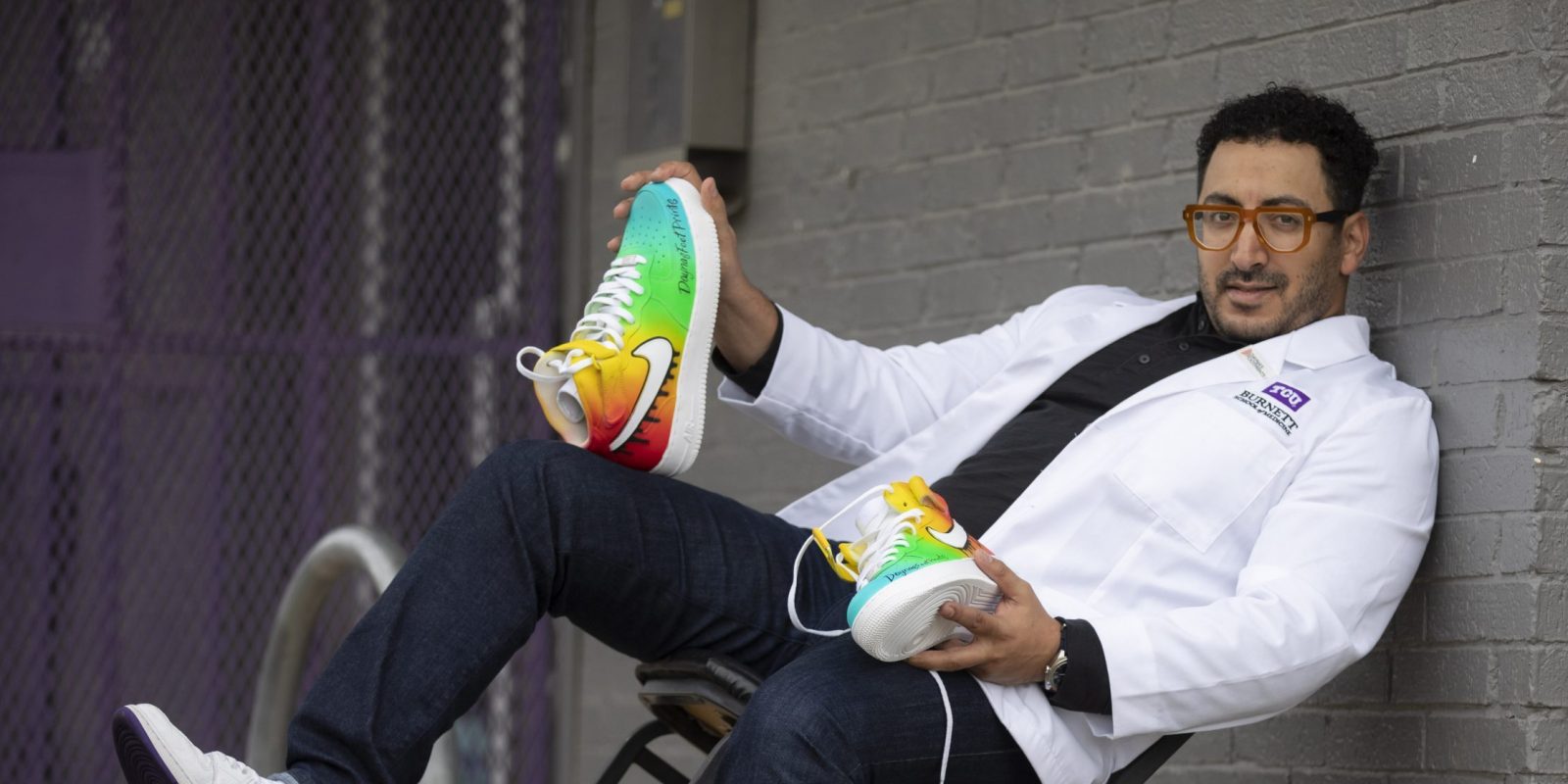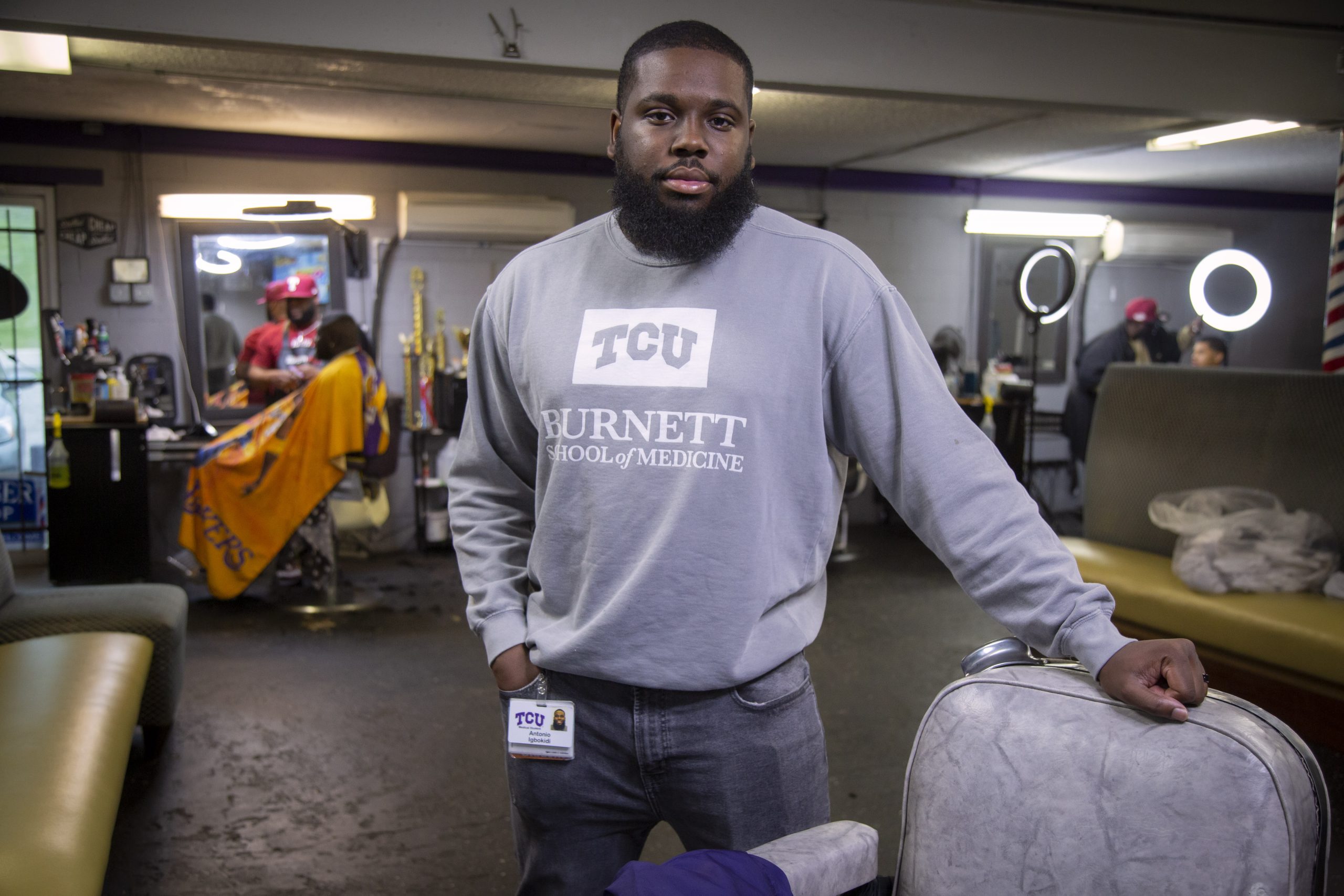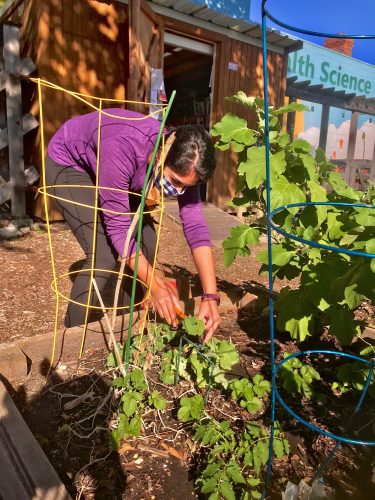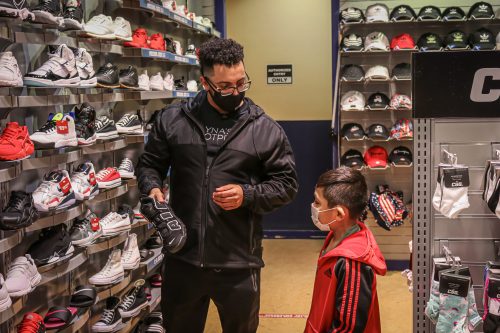
Sam Sayed pays tribute to his late sister with his nonprofit organization Dayna’s Footprints, which provides brand-name shoes for underserved children. Photo by Joyce Marshall
Med Students on a Mission
Three future doctors are serving the community through their own initiatives.
For third-year medical students Antonio “Toni” Igbokidi, Sereena Jivraj and Sam Sayed, helping patients in the clinic isn’t enough.
They each founded service projects to make an impact in the community.
TCU draws compassionate students to Fort Worth because of its Empathetic Scholar® model, which trains future physicians in problem-solving, communication and active listening. Dr. Stuart D. Flynn, founding dean of the Anne Burnett Marion School of Medicine at TCU, said the school stands out because of its humanistic approach.
“All we do is centered on treating the patient in a selfless and caring fashion,” he said, adding that the students will apply that training in empathy throughout their careers.
Students interact with patients in clinical rotations to cultivate their skills and empathy. They also participate in group service projects in TCU’s partner communities, which include three underserved Fort Worth neighborhoods — Stop Six, Northside/Diamond Hill and Como. Students have collected school supplies, administered Covid-19 vaccinations and provided health information to community members.
With support from the medical school, Igbokidi, Jivraj and Sayed have taken serving the community a step further, leading projects that connect their future health care careers with personal passions.

Toni Igbokidi’s Barbershop Talk Therapy gives Black men an outlet to discuss mental health issues with licensed therapists. The sessions rotate among neighborhood barbershops, including Lake Como House of Fades. Photo by Joyce Marshall
Let’s Talk About It
Toni Igbokidi said he knows it’s OK not to be OK.
When he listened to the communities served by the medical school, “A big need, they said, was mental health — like there aren’t enough spaces for men to really be able to communicate,” he said.
Black men are more likely to experience feelings of anxiety and depression but less likely to receive mental health treatment, according to the National Alliance on Mental Illness.
In response, Igbokidi applied for a grant to start Barbershop Talk Therapy, where community members discuss mental health with licensed therapists in local barbershops. The monthly sessions rotate among TCU’s partner communities; Igbokidi moderates between the therapists and clients.
Barbershop Talk Therapy provides Black men with a safe space to share difficulties and receive care, Igbokidi said. “Men can really start to open up and really start to heal from the inside out.”
Igbokidi’s upbringing influenced why he chose barbershops for the discussions. “Growing up, I always knew the barbershop was like the place where even the most hardened people would just give it up and just talk about everything,” he said.
“Men can really start to open up and really start to heal from the inside out.”
Tony Igbokidi, third-year medical student
Barbershop Talk Therapy also partners with the Black Heart Association and other health groups to offer free health screenings at the sessions.
The community responded: Barbershop Talk Therapy grew from three or four participants per session to 30 or 40 through word of mouth. Igbokidi hopes to expand to more locations, including beauty shops to reach women of color.
However, he said the project depends on funding. While the therapists volunteer, barbershop owners are compensated for hosting the sessions. “A lot of the barbershops would do this for free,” he said, “but it’s just so important to me for us to be able to cycle dollars back into the community.”
Igbokidi’s presence in the health care field also serves a greater purpose: Only about 3 percent of physicians are Black men, creating more health barriers for Black men to seek care. By serving the community, he can build trust and inspire others to pursue careers in medicine.
James Okpamen, a second-year medical student, has helped lead the sessions and will take over after Igbokidi graduates.
Child psychiatrist Brian Dixon praised Igbokidi as embracing and inclusive. “There’s no stranger around him,” he said.
Igbokidi, who hopes to become a youth psychiatrist, said Barbershop Talk Therapy has prepared him to connect with patients as a more empathetic caregiver. “I’m going to make sure they get the most optimal care, as I would want my own family members to have.”
Planting the Seeds
For Sereena Jivraj, community health is deeply connected to the environment.
Jivraj completed her undergraduate degree at Emory University in Atlanta, where sustainability was the norm: The university sourced food locally or from a campus greenhouse and offered recycling and composting programs.
When she came to Texas, she said, “I was explaining to someone about composting because they had never heard of it.”

Sereena Jivraj came to TCU from Georgia and quickly discovered that composting wasn’t common knowledge. Courtesy of Sereena Jivraj
Jivraj decided to educate people about how conserving the environment can slow climate change and benefit public health.
Composting food scraps and other materials reduces the amount of landfill waste that creates the greenhouse gases carbon dioxide and methane. Climate change poses massive health risks, from extreme weather events to disease spread, according to the World Health Organization.
On a personal level, a person’s environment — from air pollution to poor nutrition — can cause chronic health problems, like asthma and obesity, Jivraj said.
“If we care about sustainability now, and we can slow down climate change,” she said, “then your kids would have a better life in the future.”
Jivraj has convinced friends and family to get composting bins from the city of Fort Worth. She also published two children’s books, including Connor and His Composting Adventures, which teaches kids and their caregivers the basics of composting.
“If we can get more kids involved,” she said, “you’re kind of like priming them at a young age so that they can have that on their mind throughout their adulthood.”
Jivraj first wanted to be a nurse, but after she volunteered in delivery and neonatal intensive care units, “I realized that I wanted to be more of the leader of the team,” she said. She plans to tackle women’s health disparities as an obstetrician-gynecologist.
In her practice, Jivraj hopes to integrate sustainability and improve the health of her patients by providing produce to community members.
In her first year at TCU, Jivraj purchased a plot at the University of North Texas Health Science Center’s garden and enlisted other students to maintain a small vegetable garden.
“We were able to distribute a lot of that produce to the local community — people who don’t have access to healthy fruits and vegetables,” she said.
In January 2022, the students lost access to the plot, but she’s looking for opportunities to continue the project on or near TCU’s campus.
Samir Nangia, a nephrologist and Burnett School of Medicine physician development coach, has seen Jivraj balance schoolwork and service leadership since she started at TCU. “She’s the full package,” he said. “She’s going to make everyone at this school proud.”
“If we can get more kids involved, you’re kind of like priming them at a young age so that they can have that on their mind throughout their adulthood.”
Sereena Jivraj, medical student/author
Filling Others’ Shoes
Sam Sayed’s nonprofit, Dayna’s Footprints, is a tribute to a sister’s love and a solution to learning inequities through a unique method: shoes.
“Most people think about underfunded schools or inadequately trained teachers,” Sayed said, “but rarely do people think about things that happen before you even leave the house. For us, my brother and I just didn’t have confidence even stepping out.”

Sam Sayed created Danny’s Footprints so that children could get name-brand shoes at a young age. Courtesy of Danya’s Footprints
Their older sister Dayna changed that. When Sam and Sharif Sayed were at Foster Elementary School in Arlington, Texas, she worked all summer to buy them Nikes — their first brand-name shoes. After Dayna was tragically killed in a drive-by shooting, the brothers decided to give back.
In 2018, Sam, then a physical trainer, and Sharif Sayed started the Million Pound Challenge, where participants each lift 1 million pounds of weights in November. The brothers used their website, Instagram page and local media outlets to recruit participants who would share their progress and generate donations.
That year, they returned to Foster to give 53 students the shoes of their choice.
“If any of those kids can look back at this charitable act … and they’re able to generate any type of confidence and it leads to success in the future,” Sam Sayed said, “then Dayna’s name could be carried on.”
When Sayed started medical school, a physician development coach encouraged him to involve the school in fundraising and promotions. In 2022, his classmates helped the cause, raising funds to provide brand-name shoes like Nikes and Vans to more than 250 underprivileged kids.
Sayed said watching the students receive their first pair is the most special part. “You’re going to feel the entire rainbow of emotions.”
Dayna’s Footprints now serves the Stop Six, Northside/Diamond Hill, Como and Las Vegas Trail neighborhoods in addition to Foster Elementary.
Lynnette Kile, a friend with experience building nonprofit boards, joined as board chair in 2021.
For Kile, Sayed’s story rang true. “I didn’t get my first pair of brand-name shoes until seventh grade,” she said. “And so I was like, ‘Oh my gosh, I love this idea. I know how it makes kids feel.’ ”
Kile said Dayna’s Footprints plans to expand to more communities and build partnerships with shoe companies. She’s also seeking board members for the growing nonprofit.
Meanwhile, Sayed is balancing the organization with medical school and fatherhood, waking up at 4:30 a.m. to study.
He incorporated Dayna’s Footprints into his research thesis, investigating how participating in the shoe drives affects the medical students. “It’s making me a better person,” he said. “I know it’ll make me a better physician.”

Your comments are welcome
Comments
Related Reading:
Features
Infographic: Minors
A wide variety of minors gives TCU students the chance to add depth to their majors or dive into new areas.
Features
Venture Capitalism 101
MBA students connect investors and startups in a Neeley program.